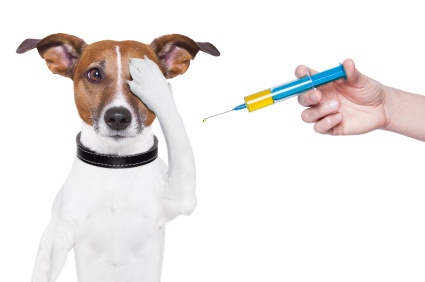Veterinarians and Vaccines: A Slow Learning Curve
by Nancy Kay, DVM
speakingforspot.com
Am I feeling frustrated and disappointed? You bet I am after reading an article titled, “Vets Slowly Move to 3-Year Vaccine Protocols” in the most recent edition of Veterinary Practice News. According to the article, approximately 60 percent of veterinarians continue to over-vaccinate their adult canine and feline patients by administering “core” vaccinations annually. This in spite of the fact that, for a decade now, it has been public knowledge that these vaccines provide a minimum of three year’s worth of protection.
Current canine and feline guidelines recommend that adult dogs be vaccinated against distemper, parvovirus and adenovirus, and adult cats against panleukopenia virus, herpesvirus and calicivirus no more than once every three years. Bear in mind, these are not rules or regulations (although I wish they were) they are simply guidelines. With the exception of rabies (mandated by state governments) veterinarians can vaccinate as often as they please.
The risks of over-vaccinating
What’s the downside to your pets receiving three-year vaccines once every year? My concerns extend far beyond wasting your money. (Please pause for a moment while I step up on my soapbox!) Vaccinations are so much more than simple shots. They truly qualify as medical procedures because each and every inoculation is associated with potential risks and benefits. While adverse vaccine reactions are infrequent and most are mild, every once in awhile a vaccine reaction becomes life threatening. As with any medical procedure, it is only logical to administer a vaccination if the potential benefits outweigh the risks. Giving a three-year vaccine once a year defies this logic in that the patient is exposed to all the risk of the procedure with absolutely no potential benefit. How in the world does this make sense?!
Why some vets continue to over-vaccinate
According to the Veterinary Practice News article, there are two reasons why approximately half of veterinarians continue to over-vaccinate. First, they believe as I do in the importance of annual health visits for dogs and cats. They also believe that the lure of a vaccine is the only way to convince their clients of the need for a yearly exam, and for good reason. In 2011, the “Bayer Veterinary Care Usage Study” documented that many people continue to believe that vaccinations are the only reason to bring their overtly healthy pet in for a veterinary visit.
The second explanation provided for over-vaccinating is that veterinarians don’t want to interrupt the revenue stream derived from annual inoculations. Despicable, in my book!
A possible third explanation is that some veterinarians remain unaware of current vaccination guidelines. If so, they must be living under a rock and begs the question, why would you want such an “outdated” individual caring for your pet’s health?
Read the Full Article and Comment Here: http://speakingforspot.com/blog/2013/03/17/veterinarians-and-vaccines-a-slow-learning-curve/




